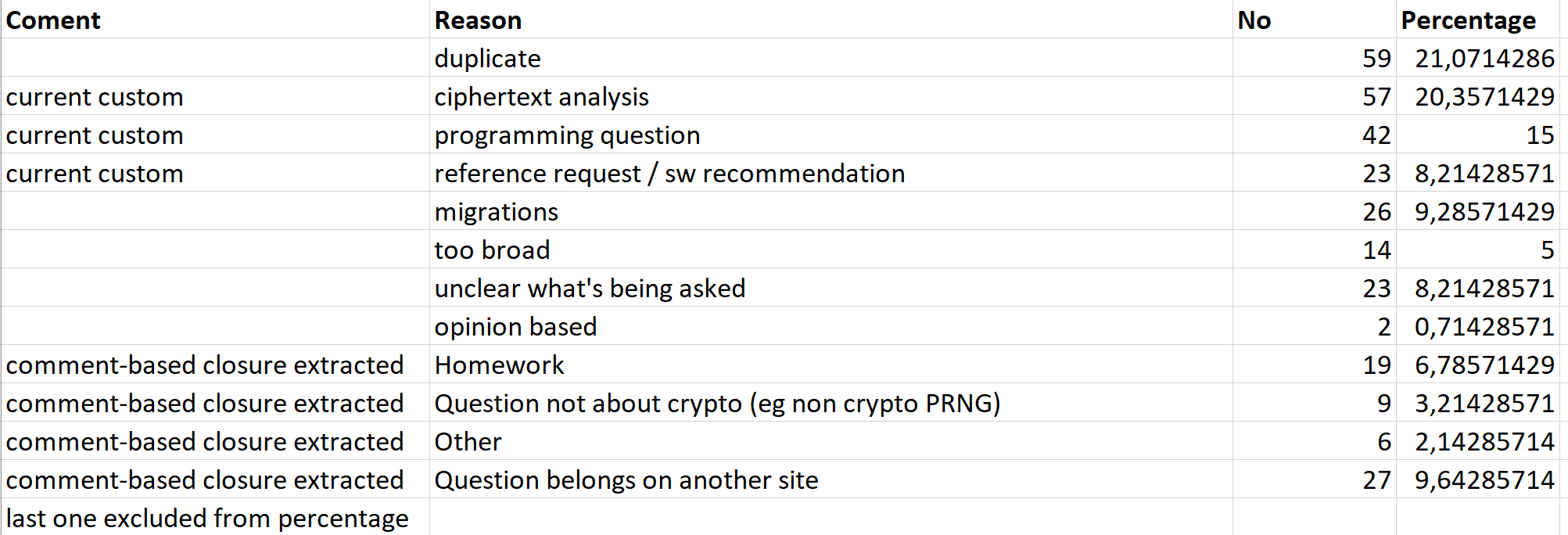A couple of years ago we voted on our site-specific off-topic close reasons. Since then we have updated them every now and then, improving formulations and the like.
However I have noticed that perhaps our "programming question" close reason isn't as useful anymore now that the mods migrate questions more aggressively. It is my subjective feeling that maybe we want to replace this close reason, e.g. with on relating to our recent homework consensus?
Status Quo
Based on data from the last 90 days, here's our current usage of close reasons and our comments (link requires 10k rep to access):
So, what are custom close reasons?
Custom close reasons are hidden behind the "off-topic" close reason. They are specific to the site (to reflect what each site considers on- and off-topic) and can be changed by the moderators as soon as two agree (one proposes, one approves).
How many custom close reasons can we have at the same time?
There are only three (3) custom close reasons for each site on the StackExchange network.
What should I include in my suggestion (= posted answer)?
A TL;DR as a headline. For example, by writing:
## Reference recommendationThe formatted text to be displayed in the close reason menu. For example, by writing:
Requests for reference recommendations are off-topic here. For details, see: Do we want “literature recommendations” and similar “list/subjective questions”?- An explanation of when to use this close reason (may be omitted if obvious)
Links to all relevant meta questions (if any) concerning this close reason. For example, for "Reference Recommendation", you would be expected to add a link to the question Do we want “literature recommendations” and similar “list/subjective questions”? by writing:
- [Do we want “literature recommendations” and similar “list/subjective questions”?](https://crypto.meta.stackexchange.com/q/1/)- (optional) Remarks / comments, such as "Remark: As of the time of this post, this is an established close reason" or "Remark: This is a merge of close reason A and B"
The above formatting can be witnessed by example using the pre-provided answers for our existing close reasons.
How does this "election" work?
Question Score
In the unlikely case that this question itself scores less than +6 by itself, then the need for a change is considered non-existent and the election is void. If the question score less than -6, I promise not to ever again come up with such a question.
- Vote +1 on the question to indicate that you want to (regularly) update the close reasons.
- Vote -1 to indicate that you don't want to see a change with the close reasons at all and generally disapprove the idea of electing custom close reasons.
- Don’t vote to indicate that you don't care.
Answer Scores
Each answer contains one close reason suggestion. After one month (i.e. at the end of January) we come back to this question and see if there is a strong need to change our exisiting close reasons and replace them with more useful ones. The top three voted close reasons will be our custom close reasons given, that they all score more than +6 (the same threshold as for community ads). If less than three answer score above the threshold and there's a change, then the established close reason with the least votes gets kicked out.
- Vote +1 on an answer to indicate that you want that reason established.
- Vote -1 to indicate that you don't want to see that reason.
- Don’t vote to indicate that you don't care.
Deadline for Votes
The deadline (for this election) is the last day of January (aka the 31st January 2019) and the elected actions will be carried out in early February 2019.

